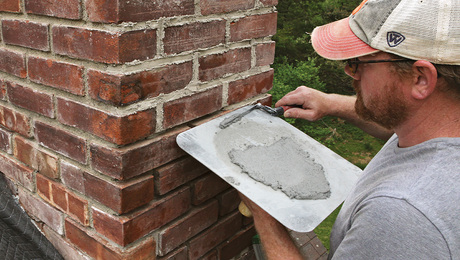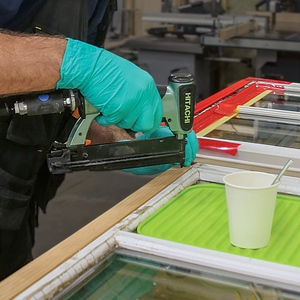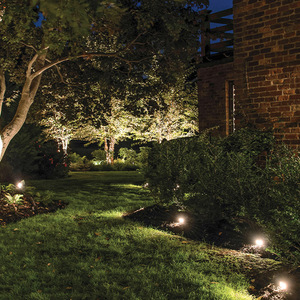*
I am going to build a new home in a very wooded area and have been told to think about not putting up gutters because of all the leaves. I know that there are all kinds of gutter leaf protection out there, but, I am not convinced that they work. My father’s home has a gutter guard system and pin oak leaves have clogged it up. What is the answer? So if I do not install gutters at my new home, how will I protect my basement from water and moisture damage? Seeking help!!
Discussion Forum
Discussion Forum
Up Next
Video Shorts
Featured Story

Old masonry may look tough, but the wrong mortar can destroy it—here's how to choose the right mix for lasting repairs.
Featured Video
How to Install Cable Rail Around Wood-Post CornersHighlights
"I have learned so much thanks to the searchable articles on the FHB website. I can confidently say that I expect to be a life-long subscriber." - M.K.
Fine Homebuilding Magazine
- Home Group
- Antique Trader
- Arts & Crafts Homes
- Bank Note Reporter
- Cabin Life
- Cuisine at Home
- Fine Gardening
- Fine Woodworking
- Green Building Advisor
- Garden Gate
- Horticulture
- Keep Craft Alive
- Log Home Living
- Military Trader/Vehicles
- Numismatic News
- Numismaster
- Old Cars Weekly
- Old House Journal
- Period Homes
- Popular Woodworking
- Script
- ShopNotes
- Sports Collectors Digest
- Threads
- Timber Home Living
- Traditional Building
- Woodsmith
- World Coin News
- Writer's Digest


















Replies
*
I'm not sure I can give you good advice on whether to use gutters or not (I think they are the work of the devil), but without doubt, the bigger overhang you have, the better. Gutters are a pain in the ass, but depending on your roof, they may be necessary. Roof valleys concentrate water and make it difficult to dispose of without gutters. Careful landscaping and detailing of your foundation can help minimize ground water problems.
*
Michael,
Do yourself a favor and install the gutters on your new house. They are a major barrier for all that water coming off the roof and you can direct that water to go where you want it to go instead of all along the foundation. Even if the grade was away from the house all the way around, the ground would be soaked all around the house after a hard rain. You will need to clean out your gutters several times a year but that beats repairing the damage that water can do over time. I have never come across a good gutter guard system that didn't let the small stuff in and that also looked appropiate to be on my house.
G Willey
*
Michael,
Mike Smith gave me some advice on window flashing not too long ago and at the end of his post he said "now let's talk about designing rain gutters out of your life". It didn't go any further than that but you might want to ask him about it. The guy knows his stuff and he might be able to give you some really good ideas. Try E-mailing him or wait to see if he responds to your post. Good luck.
Gaby
*I have mixed feelings about rain gutters. I grew up in Western Oregon where it rains alot, but has little snow, so gutters were nessessary to drain water away from the house. Some architects I did work for used a built-in gutter hidden behind the facia board. This was much better looking than continous metal gutters. I then lived in Houston, Texas for 14 years. Thunder storms were almost a daily occurrence in the summer months and again gutters were nessessary. Now I live in the Philadelphia area where rain is not as frequent, but snow can do real damage, so I'm less inclined to use them. Futhermore I hate to look at them unless they are somehow hidden. You need to weight looks over perceived need. Good luck, Bill Swales
*Search the archives for some great discussions among the gutter-haters. There are good ways to reduce the pain of gutters or even eliminate them with appropriate design and landscaping. Some of the gutter covers work better than others, and i suggest the best for you depends on the type of debris.No small factor is the risk of injury climbing a ladder to clean the darn things. And they are most likely to fail when they are needed most -- a big storm that knocks all the loose leaves out of the trees and off the roof into the drain. I eliminated my gutters where the earth below was paved and backsplash was not a problem; others are nice and large, and covered with shields. I also buried pipes to carry the water away from the foundation -- splash blocks really don't cut it.
*.....did someone mention gutters ?when I started in this business in the '60's most of our work was repair and most of the repair had to do with water getting into the house from a failed gutter system..I thot it was jsut the way things were.....started skiing and noticed that ski country doesn't use much gutters soI researched it some more and found that a lot of architects hate gutters and design their way out of using them...it screws up their work...1) gutter guards suck....installed and repaired and moved and put up and taken down , most don't work,, & stop working when the customer is too old to do anything about it or has a reduced income and can't pay people to come fix 'emBest of the worst sems to be Gutter Helmet, 2) Overhangs designed into your house do several things..Protect the tri, siding and window / door assemblies.They move the water off the roof and let it flow onto the ground. If you have valleys or other roof areas that concentrate water, you can use flow diffusers and redirect or slow the water, or use a judicious single purpose gutter to take care of that one problem area.3) if you have an entry, design a porte cochere (sic?) over it , add some class to the front...or use a diverter, or a small gutter just to take care of the entry40 The rain falling off the roof will cut a very small line in the sod or garden bed...if your overhangs are generous (I like 16" or 12" this line will be far enough out into the grass so the grass will cover it on both sides...we get about 35" of rain a year, so apply that to what you get...if its falling into a garden area or planting bed, put some crushed stone down in the fall area.Grade.. grade....grade..part of good design is locating the house and making the grade so no water collects ANYWHERE..if you have a problem area put an underdrain perf pipe and get that water out of thereBasements: should all have underdrain systems designed into them so ground water drains to daylight,,, or if not possible, collects in a sump and gets pumped out and away from the foundation....this is no different than trying to figure out where you're going to lead a downspout to.We still do a lot of work with gutters: aluminum, copper, galvanized, and wood,....built-in, bar hangers, fascia hangers, but we don't use straps and we don't use tube& nail.... and we do a good job of installing and maintaining them...we just try to design our way out of using them if we get the chance....b As soon as you step away from the house, you're gonna get wet.....Kermit (IMHO)
*This is to add a yea to the NO gutter system. Concentrate your time and money in the ground. Design your foundation system to resist and remove water. Houses with or without gutters and poor foundation drainage and waterproofing will introduce water into your basement. And not necessarily just "normal" drainage and waterproofing. Do it right. Put the tile or perf. pipe next to the footer not on top. Use filter fabric on top of the pipe to keep the fines out and backfill with stone. Make sure your wall waterproofing is the best for your soil type and location. And give it a place to go. Do it right now because digging up your wife's plantings later is not a pretty sight.I'm in the woods, on a hill, 10 yrs w/o gutters. 2' ohang, Warm and Dry waterproofing system, stone backfill to grade, clay soil, plantings out 3' from house. Dry as a bone in live in, walk out basement. Get a little wet in a heavy rain walking out the door, but you can't have it all.(sure you can if you plan it right). This is of course my opinion and I certainly don't know it all. Best of luck.
*Gutters may look bad to purists and architects, but so does red dirt stain two feet up the house. It's situational and design-related. If you have red dirt (southeast), you should either have pine needle collecting gutters or design overhangs to reduce the splash against the house. If you have a basement, you should definitely design in a foundation drainage system (as already mentioned), with or without gutters.
*
Boy, there are a lot of gutter haters out there. Here in the Rochester area of upstate N.Y. I see better than 99% of existing and new housing with gutters. To my eye, a house looks odd without them. I just can't imagine living in a house with roof water hitting the ground all around the house.
*
Use bushes to catch the falling water? Definitely it can't hit dirt, and rain will bounce a fair distance back off asphalt too. A good overhang helps a lot here.
*Red dog,I did so (lived in a gutterless house) in Hawaii, and it was rather pleasant to hear the splash outside -- great for sleeping. We had jalousie windows, which allowed ventilation during the rain. I would imagine this would apply to certain parts of Florida, as well.
*God I love this post. Everyone has a different opinion and no one is really all right or all wrong.I like gutters, but with or without them you need a perimeter drainage system. So its really not an "either/or" question. The two are not mutually exclusive.Assuming you are leaning to no gutters, I second the wide overhang, it will protect your casings and trim, and you'll get another 5 years out of a paint job. On the ground, I would go hardscape. Concrete slabs, about 4-5 feet wide, around the home. Slope them out, and top with pea gravel to make them look decent. Even wider would be better. Bushes to conceal them to the outside of the slab.Want more protection? Add 4" floor drains to the slab at every corner, and connect them via 4" ABS and slope them out the back or to your low point in your lot. Live in the NW where you get over 25" of rain? Make them 6" ABS. Want more protection? Drain them to a dry well, which can be made with used 50 gal drums, or bought in a pre-fab concrete.Personally, I'd have gutters and some form of the above, depending on how much moisture you get.
*
I am going to build a new home in a very wooded area and have been told to think about not putting up gutters because of all the leaves. I know that there are all kinds of gutter leaf protection out there, but, I am not convinced that they work. My father's home has a gutter guard system and pin oak leaves have clogged it up. What is the answer? So if I do not install gutters at my new home, how will I protect my basement from water and moisture damage? Seeking help!!